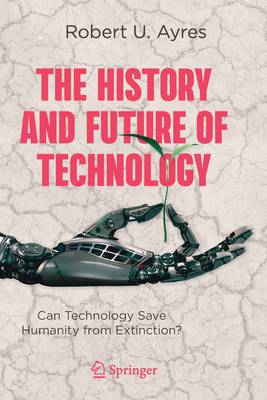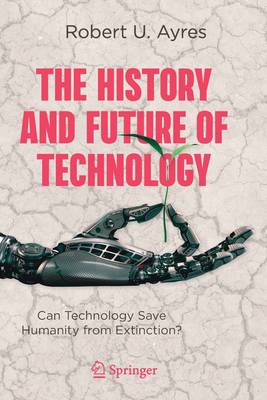
- Afhalen na 1 uur in een winkel met voorraad
- Gratis thuislevering in België vanaf € 30
- Ruim aanbod met 7 miljoen producten
- Afhalen na 1 uur in een winkel met voorraad
- Gratis thuislevering in België vanaf € 30
- Ruim aanbod met 7 miljoen producten
The History and Future of Technology
Can Technology Save Humanity from Extinction?
Robert U Ayres
Paperback | Engels
€ 90,45
+ 180 punten
Uitvoering
Omschrijving
Eminent physicist and economist, Robert Ayres, examines the history of technology as a change agent in society, focusing on societal roots rather than technology as an autonomous, self-perpetuating phenomenon. With rare exceptions, technology is developed in response to societal needs that have evolutionary roots and causes. In our genus Homo, language evolved in response to a need for our ancestors to communicate, both in the moment, and to posterity. A band of hunters had no chance in competition with predators that were larger and faster without this type of organization, which eventually gave birth to writing and music. The steam engine did not leap fully formed from the brain of James Watt. It evolved from a need to pump water out of coal mines, driven by a need to burn coal instead of firewood, in turn due to deforestation. Later, the steam engine made machines and mechanization possible. Even quite simple machines increased human productivity by a factor of hundreds, if not thousands. That was the Industrial Revolution.
If we count electricity and the automobile as a second industrial revolution, and the digital computer as the beginning of a third, the world is now on the cusp of a fourth revolution led by microbiology. These industrial revolutions have benefited many in the short term, but devastated the Earth's ecosystems. Can technology save the human race from the catastrophic consequences of its past success? That is the question this book will try to answer.
If we count electricity and the automobile as a second industrial revolution, and the digital computer as the beginning of a third, the world is now on the cusp of a fourth revolution led by microbiology. These industrial revolutions have benefited many in the short term, but devastated the Earth's ecosystems. Can technology save the human race from the catastrophic consequences of its past success? That is the question this book will try to answer.
Specificaties
Betrokkenen
- Auteur(s):
- Uitgeverij:
Inhoud
- Aantal bladzijden:
- 830
- Taal:
- Engels
Eigenschappen
- Productcode (EAN):
- 9783030713959
- Verschijningsdatum:
- 29/07/2022
- Uitvoering:
- Paperback
- Formaat:
- Trade paperback (VS)
- Afmetingen:
- 156 mm x 234 mm
- Gewicht:
- 1165 g

Alleen bij Standaard Boekhandel
+ 180 punten op je klantenkaart van Standaard Boekhandel
Beoordelingen
We publiceren alleen reviews die voldoen aan de voorwaarden voor reviews. Bekijk onze voorwaarden voor reviews.









